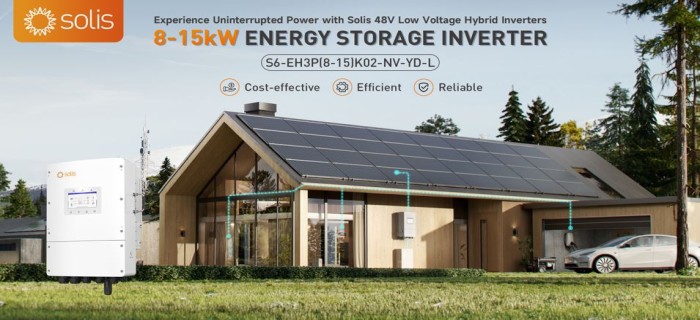
The Growth of Low-Voltage Energy Storage in the Residential Market: A Focus on Solis’s S6-EH3P(8-15)K Inverter
As the demand for reliable, efficient, and scalable residential energy storage solutions continues to surge globally, particularly in emerging markets across Asia, Africa, and Middle East, low-voltage energy storage systems are proving increasingly popular. Characterized by their cost-effectiveness and adaptability, these systems are now becoming a mainstream choice for households seeking to store and manage energy efficiently.
This article explores the rise of low-voltage energy storage in the residential market and delves into the features of Solis’s S6-EH3P(8-15)K inverter, designed to meet the unique requirements of residential energy storage.
1. Why Low-Voltage Systems are Becoming the Residential Standard
Low-voltage systems, typically operating within a voltage range of 40-60V, are designed to provide safe and manageable energy solutions ideal for home environments. Unlike high-voltage systems that require series configurations of smaller battery cells, low-voltage systems operate on parallel configurations, allowing larger, cost-effective battery cells with capacities of 100Ah or more. This configuration not only reduces costs but also simplifies the balance-of-system (BOS) requirements, making these systems more accessible for residential use.
2. Key Advantages of Solis’s S6-EH3P(8-15)K Inverter
The Solis S6-EH3P(8-15)Kinverter represents a leading solution for low-voltage residential energy storage, featuring a 48V battery voltage range. This inverter is designed to meet varying household demands while integrating seamlessly with PV panels and diverse battery types, including lithium-ion and lead-acid batteries. Some of its standout features include:
- Generator Integration: Automatic switching between battery and diesel generator during power outages ensures uninterrupted energy supply.
- Smart Load Management: This feature prioritizes essential appliances, optimizing energy use and enabling peace of mind for households in off-grid scenarios.
- Dual Backup Output: The system provides dedicated outputs for critical and non-critical loads, ensuring that essential devices remain powered even during extended outages.
- High Overload Capability: With a 200% overload capability, the S6-EH3P(8-15)Kcan handle the power demands of high-consumption appliances, such as air conditioners and refrigerators, without compromising performance.
- Ultra-fast Switching: Offering 4ms switching speed during power cuts, this inverter delivers a near-uninterruptible power supply, ideal for supporting sensitive devices.
3. Technical Considerations and Advantages of Low-Voltage Systems
Low-voltage energy storage systems like the S6-EH3P(8-15)Kprovide several technical benefits:
- Cost-Effective Maintenance and Scalability:Parallel battery configurations allow for individual battery module replacement without affecting the system, making it easier and more affordable to maintain. Low-voltage systems also support flexible expansion by adding parallel modules, which can increase system capacity without requiring voltage adjustments.
- Enhanced Safety: The lower voltage of these systems translates to reduced operational risk, making them safer for household environments. Users can perform maintenance tasks without the need for extensive technical expertise or high safety precautions, a significant advantage over high-voltage systems.
- Efficient Power Management for Residential Use: Although high-voltage systems are more efficient for long-distance transmission, low-voltage systems perform effectively within residential applications due to shorter transmission distances and optimized design to mitigate power loss from high current.
4. Market Trends and Scalability in Residential Energy Storage
Solis’s low-voltage product range showcases a robust scalability feature, catering to the growing need for customizable energy storage. The S6-EH3P(8-15)K, for instance, allows up to six units to be connected in parallel, achieving an expanded capacity of up to 90kW. This adaptability is particularly beneficial in residential settings, where energy requirements can increase over time as households incorporate more power-hungry devices or expand living spaces.
Low-voltage residential energy storage systems, exemplified by Solis’s S6-EH3P(8-15)Kinverter, are emerging as a viable solution for households seeking reliable, cost-effective, and scalable energy storage solutions. With features designed to support a range of power demands and provide seamless backup options, these systems are poised to redefine residential energy resilience and sustainability.

.gif)
.jpeg)
leave your comment